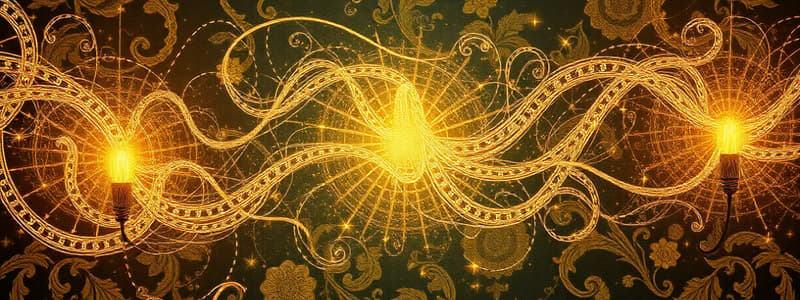Podcast
Questions and Answers
How much power in Watts is generated by an engine producing 200 hp?
How much power in Watts is generated by an engine producing 200 hp?
- 200,000 W
- 100,000 W
- 150,000 W
- 150,750 W (correct)
What is the formula for calculating power when considering torque and angular velocity?
What is the formula for calculating power when considering torque and angular velocity?
- P = Torque + Angular Velocity
- P = Torque - Angular Velocity
- P = Torque × Angular Velocity (correct)
- P = Torque / Angular Velocity
Which of the following best describes instantaneous power?
Which of the following best describes instantaneous power?
- Power that includes mechanical and electrical energy
- Power measured over a time interval
- Average power calculated over several seconds
- Power delivered at a single moment in time (correct)
What is the mechanical power output of a car engine running at 1200 rpm with a torque force of 120 Nm?
What is the mechanical power output of a car engine running at 1200 rpm with a torque force of 120 Nm?
How is electrical power in a circuit calculated when voltage and current are known?
How is electrical power in a circuit calculated when voltage and current are known?
What happens if an electrical device is plugged into a socket with a higher power rating than the device itself?
What happens if an electrical device is plugged into a socket with a higher power rating than the device itself?
If a battery provides 12V with a current of 8 Amps, what is the electrical power in the circuit?
If a battery provides 12V with a current of 8 Amps, what is the electrical power in the circuit?
What is the definition of power in physics?
What is the definition of power in physics?
Which of the following statements best describes the relationship between power and distance in a physical system?
Which of the following statements best describes the relationship between power and distance in a physical system?
What unit is used to measure power in physics?
What unit is used to measure power in physics?
How is 1 horsepower related to Watts?
How is 1 horsepower related to Watts?
In the power formula, which of the following expressions can also represent power?
In the power formula, which of the following expressions can also represent power?
What happens to the power of a system if the energy released is constant, but the time taken to release that energy decreases?
What happens to the power of a system if the energy released is constant, but the time taken to release that energy decreases?
Why is a bulb with higher wattage brighter than one with lower wattage?
Why is a bulb with higher wattage brighter than one with lower wattage?
James Watt is associated with the measurement of power because he:
James Watt is associated with the measurement of power because he:
Flashcards
Power (Physics)
Power (Physics)
Rate at which work is done or energy is transferred.
Work (Physics)
Work (Physics)
Energy transferred when a force moves an object a distance.
Power Unit
Power Unit
Watts (W), equal to Joules per second (J/s).
Horsepower
Horsepower
Signup and view all the flashcards
Power Formula
Power Formula
Signup and view all the flashcards
Power Formula Components
Power Formula Components
Signup and view all the flashcards
High Power Example
High Power Example
Signup and view all the flashcards
Power and Speed
Power and Speed
Signup and view all the flashcards
Power (Physics)
Power (Physics)
Signup and view all the flashcards
Mechanical Power
Mechanical Power
Signup and view all the flashcards
Electrical Power
Electrical Power
Signup and view all the flashcards
Torque
Torque
Signup and view all the flashcards
Angular Velocity
Angular Velocity
Signup and view all the flashcards
Power Calculation (Torque and Velocity)
Power Calculation (Torque and Velocity)
Signup and view all the flashcards
Horsepower to Watts
Horsepower to Watts
Signup and view all the flashcards
Study Notes
Power in Physics
- Power is the rate at which energy is transferred or work is done.
- It's measured in Watts (W), equivalent to Joules per second (J/s).
- Higher wattage (e.g., 100W bulb) releases more energy per second compared to lower wattage (e.g., 40W bulb).
- Power is related to work. More power allows for greater distance covered and more energy transferred over time. (e.g., a motorcycle has more power than a bicycle)
Definition of Power
- Power (P) is defined as work done (W) or energy released (E) per unit time (t).
- P = W/t or P = E/t
Units of Power
- The unit of power is the Watt (W).
- 1 W = 1 J/s
- James Watt's experiments measuring work done over time established the concept.
- 1 horsepower (hp) is approximately equal to 750 Watts (W).
Power Formula
- Power (P) is calculated as force (F) times distance (d) per time (t).
- P = F × d / t
- Power can also be calculated in rotational motion as torque (τ) times angular velocity (ω).
- P = τ × ω
Torque and Power
- Torque (τ) is rotational force. It's involved in moving objects around a fixed point (e.g., tightening a bolt).
- Power calculation with torque involves radius (r), force (F), and angle (sin θ).
- P = F × r × sin θ × ω or: P = τ × ω (where ω = angular velocity in radians/second)
- Angular velocity (ω) describes how fast an object rotates (e.g., rotations per second).
Instantaneous vs. Average Power
- Instantaneous power: power delivered at a specific moment in time.
- Average power: power over a time interval.
Mechanical Power
- Mechanical power measures the rate at which mechanical energy is produced.
- It's related to the work done over time.
Electrical Power
- Electrical power measures the rate at which electrical energy is transferred in a circuit.
- Electrical power (P) = voltage (V) × current (I).
- P = IV
- Current (I) is charge (C) per time (seconds).
- Voltage (V) is energy (Joules) per charge (Coulomb).
- Power rating: maximum electrical energy that can flow through a device. Matching power rating to the electrical outlet is important.
Calculating Power
- Examples provided for calculating mechanical and electrical power using the formulas.
Studying That Suits You
Use AI to generate personalized quizzes and flashcards to suit your learning preferences.




